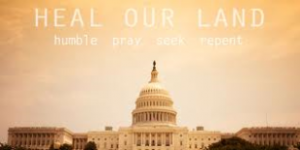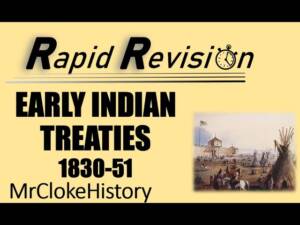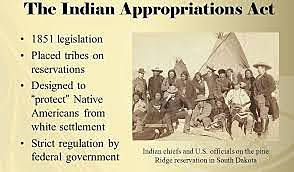
Article I, Section 8 of the Constitution states that “Congress shall have the power to regulate Commerce with foreign nations and among the several states, and with the Indian tribes”, determining that Indian tribes were separate from the federal government, the states, and foreign nations; and
The European countries that colonized North America dealt with the native tribal governments as sovereign governments, that is, as governments that had independent and supreme authority over their citizens and territories. Especially in the area of the present day United States, the European powers interacted with American Indian tribal governments through official diplomatic means. Starting with England as early as 1620, and France, Spain, and Holland, the European powers negotiated with Indian tribes through official government to government council sessions and by entering treaties which recognized tribal governmental control over the territory of this “New World.” The European countries had a selfish motive for dealing with American Indian tribes in this fashion. The European governments wanted to legitimize the transactions they entered with Indian tribes to buy tribal lands. Thus, they wanted to make the transactions look official and legal by buying Indian lands through governmental treaties so that other European countries could not contest or object to these land sales.
The United States adopted this tradition of dealing with Indian tribes as sovereign governments from the European powers. From the very beginning of its existence, the U.S. dealt with Indian tribes on an official governmental and treaty making basis. Political involvement in Indian affairs was a very important part of governmental life in early America. Indian tribes were very powerful in the 1700s and early 1800s in America and were a serious threat to the new United States. Hence, the United States government was heavily involved in negotiating and dealing with tribes as part of its governmental policies. The United States ultimately negotiated, signed and ratified almost 390 treaties with American Indian tribes. Most of these treaties are still valid today. The United States did not give Indian tribes anything for free in these treaties. Instead, the treaties were formal government to government negotiations regarding sales of land and property rights that the tribes owned and that the United States wanted to buy. The United States Supreme Court stated in 1905 that United States and Indian treaties are “not a grant of rights to the Indians, but a grant of rights from them — a reservation of those not granted.” Thus, while tribal governments sold some of their rights in land, animals, and resources to the United States for payments of money, goods, and promises of peace and security, the tribes held onto or reserved to themselves other lands and property rights that they did not sell in the treaties. The United States Supreme Court has likened these Indian treaties to contracts between “two sovereign nations.” http://www.flashpointmag.com/amindus.htm
So the question remains: Are native American tribes and their governments still sovereign nations to be negotiated with by treaty? In 1871, it appears that Congress ruled no on this issue, solidifying the federal governments position towards natives:
That hereafter no Indian nation or tribe within the territory of the United States shall be acknowledged or recognized as an independent nation, tribe, or power with whom the United States may contract by treaty: Provided, further, that nothing herein contained shall be construed to invalidate or impair the obligation of any treaty heretofore lawfully made and ratified with any such Indian nation or tribe.
— Indian Appropriations Act of 1871[11][12]
So, it appears that the treaties in place were supposed to be upheld by the Federal government. Yet clearly they were not.
Native American sovereignty and the Constitution[edit]
The United States Constitution mentions Native American tribes three times:
- Article I, Section 2, Clause 3 states that “Representatives and direct Taxes shall be apportioned among the several States … excluding Indians not taxed.”[2]According to Story’s Commentaries on the U.S. Constitution, “There were Indians, also, in several, and probably in most, of the states at that period, who were not treated as citizens, and yet, who did not form a part of independent communities or tribes, exercising general sovereignty and powers of government within the boundaries of the states.”
- Article I, Section 8 of the Constitution states that “Congress shall have the power to regulate Commerce with foreign nations and among the several states, and with the Indian tribes”,[3]determining that Indian tribes were separate from the federal government, the states, and foreign nations;[4] and
- The Fourteenth Amendment, Section 2 amends the apportionment of representatives in Article I, Section 2 above.[5]
These basic provisions have been changed or clarified by various federal laws over the history of the United States. Regulate historically meant facilitate, rather than control or direct in the more modern sense. Therefore, the Congress of these United States was to be the facilitator of commerce between the states and the tribes.[6]
These Constitutional provisions, and subsequent interpretations by the Supreme Court (see below), are today often summarized in three principles of U.S. Indian law:[7][8][9]
- Territorial sovereignty: Tribal authority on Indian land is organic and is not granted by the states in which Indian lands are located.
- Plenary power doctrine: Congress, and not the Executive Branchor Judicial Branch, has ultimate authority with regard to matters affecting the Indian tribes. Federal courts give greater deference to Congress on Indian matters than on other subjects.
- Trust relationship: The federal government has a “duty to protect” the tribes, implying (courts have found) the necessary legislative and executive authorities to effect that duty.[10]
Clearly the breaking of treaties violates the trust relationship responsibility required by Congress.
The question I pose is simple: Where do we go from here?
Clearly honorable treaties were originally written between the US government and various native American tribes. All of these treaties were broken, and I believe God Himself is holding this nation accountable for this treacherously. So, how do we fix it?
Only through Jesus:
But Jesus beheld them, and said unto them, With men this is impossible; but with God all things are possible
Hundreds of years have come and gone, and gross injustices and atrocities have been committed against Native Americans by this government. With man, to fix this twisted history is impossible, only the sovereign creator of the universe, heaven and earth has the power to fix it.
SO, the great task before us, is to seek Him as to how to do this.
I wish to propose a simple solution, that I believe will work.
If you are a Christian who has attended a Bible believing church, you have surely heard this verse preached:
2 Chronicles 7:14 (KJV)
14 If my people, which are called by my name, shall humble themselves, and pray, and seek my face, and turn from their wicked ways; then will I hear from heaven, and will forgive their sin, and will heal their land.
Notice in this verse, God is requiring His people, those of us that claim to serve Him to humble ourselves and pray, seek His face, and then turn from our wicked ways.
For seven years, Native American Yuchi elder Dr. Negiel Bigpond worked with senator Brownback of Kansas to draft up the resolution of apology to native Americans: https://www.congress.gov/bill/111th-congress/senate-joint-resolution/14/text
This was signed by president Obama, but has never been read publicly. Natives, and those of us who love them are painfully aware of this: https://indianlaw.org/node/529
Over the past years, I have attended ‘All Tribes DC’ the national native American day of prayer held in Washington, DC, and it has been our earnest prayer that president Trump would publicly read this document, as it would help bring great healing to our land. Dr Negiel Bigpond and Chuck Pierce have been spearheading this initiative, and it will surely come to pass. I believe that president Trump is a true patriot, who honestly wants what is best for the USA. This is Gods highest and best, a bright and glorious future through the cross and blood of our Lord Jesus Christ.
After this is done, we must address the next portion of this Bible text:
‘Turn from their wicked ways’
If you recall my sermon entitled ‘The native American mandate’ (https://www.chrisaomministries.com/2017/02/the-first-nations-mandate-pray) you recall the example of how God held the entire nation of Israel accountable based upon the atrocities committed against Gibeonites by king Saul.
If we are to turn from our wicked ways as a nation, we must now do right by native Americans. This is what I propose:
While I am against the whole ‘entitlement’ an ‘victim’ mentality I have seen in certain divisive racist agendas, I do believe in freedom, liberty and justice for all (all the includes natives). LIFE, LIBERTY and the pursuit of happiness..
What I would like to see is tribal leaders to review the previous treaty broken by the federal government, and to carefully, in light of 2024 current conditions, propose a new treaty. Have it drafted up and presented to congress, and the president, and I believe it will be accepted, ratified, and more importantly kept by this current administration.
I believe that as this is done, God Himself will get involved, and will release upon the USA His full blessing, currently being partially withheld across the land.


